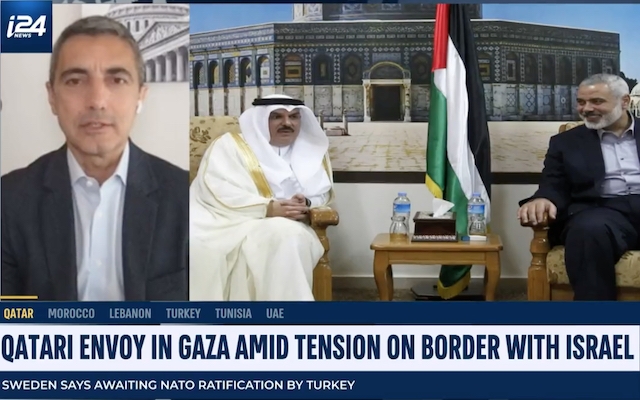As many Gulf Arab states seemingly align their foreign policies toward rapprochement with Israel, most notably through the Abraham Accords, Qatar stands out as an anomaly. A financial backer of Hamas and other groups designated as terrorist organizations, Qatar has consistently refrained from endorsing the normalization wave sweeping its neighboring countries. However, recent actions suggest that even Qatar’s tolerance for the incessant cycle of hostilities against Israel followed by reconstruction may be diminishing.
Yesterday (Thursday), Mohammed Al-Emadi, the Qatari envoy responsible for Gaza, entered the territory via the Israeli-controlled Erez Crossing, also known locally as Beit Hanoun-Erez Crossing. He led a delegation aiming to revive Gaza's beleaguered infrastructure and distribute humanitarian aid.
News you want find on Aljazeera:#Qatar Amb Emadi arrived in Gaza to dissuade Hamas from instigating protesters to violate border with #Israel. Hamas wants more Qatari money to cover for its corruption causing Palestinian poverty.
— Hussain Abdul-Hussain (@hahussain) September 7, 2023
Our problem with Qatar is its two-faced… https://t.co/AyJcWGpTqE
Infrastructural Challenges in Gaza: A Dire Need for Intervention
The delegation is zeroing in on ongoing projects, most urgently the electricity crisis which serves as a crippling handicap to Gaza’s socioeconomic fabric. Additionally, Al-Emadi reconfirmed Qatar’s commitment to impoverished families in the region. As announced last August, a cash grant of $100 will be dispersed to approximately 100,000 families in need, facilitated through United Nations-operated centers across Gaza's governorates.
A Diplomatic Ballet: Egypt’s Entry into the Conversation
Not to be outdone in regional influence, Egypt has recently intensified its diplomatic engagement with Israel. Senior Egyptian officials have held dialogues focusing on various matters, including the pressing issue of Gaza’s reconstruction. Utilizing its strategic assets, such as the Arish airport in Northern Sinai and the Gaza offshore gas field, Egypt aims to strengthen its regional economic foothold.
Evidently the leaders of Iran, Hamas and Palestinian Islamic Jihad do not care about the high rate of poverty and unemployment in the Gaza Strip. Why should these leaders care when they and their families are living in comfort in Qatar, Lebanon and Turkey? https://t.co/Ac0ViwcsUN
— Yosef Hartuv (@LoveoftheLand) September 7, 2023
Security Imperatives and Economic Pitfalls: Israel’s Dilemma
While international efforts in Gaza’s reconstruction gain traction, Israel faces a security quandary. After an attempt to smuggle explosives via the Keren Shalom crossing was thwarted, Israeli authorities imposed an immediate halt on commercial exports from Gaza. Though aimed at safeguarding its citizens, this decision invited criticism from Palestinian economic organizations. Curiously, these criticisms conspicuously sidestepped Israel’s security concerns, which were the catalyst for the export ban.
Entrepreneurial Hurdles: Gazan Business Owners Speak Out
The economic repercussions of Israel's security measures have rippled through Gaza's business community. Walid Ballour, a factory manager specializing in plastic pipes, describes how the export ban has disrupted his trade routes to Judea and Samaria. Strikingly absent from his narrative, however, was any reference to the explosives intercepted in similar shipments, presumed to be the handiwork of Islamic Jihad or Hamas. Awni Abu Hasira, a prominent fish supplier, echoed this sentiment, characterizing the ban as a “death sentence” for his business, yet failing to attribute any of the unfolding crisis to Hamas or Islamic Jihad.
Armed Palestinian groups at the Gaza border are producing videos showing off explosives they use at the security fence. The speaker addresses the violence in the West Bank and urges Palestinian to resist. pic.twitter.com/UuGr726C6C
— Joe Truzman (@JoeTruzman) September 8, 2023
Omertà in Gaza: The Culture of Silence
A stifling culture of fear dominates the Hamas-controlled Gaza Strip. This oppressive environment has effectively quashed any open dialogue on governance and terrorism, forcing many ordinary Gazans to seek asylum in Europe. Alarmingly, this self-imposed gag rule extends to the business community, who remain reluctant to criticize or hold militant groups accountable for Gaza's worsening plight.
Conclusion: A Multi-Dimensional Puzzle
In summary, a host of diplomatic initiatives are currently aimed at ameliorating Gaza’s dire conditions. However, these efforts are overshadowed by Israel's genuine security anxieties and the disproportionate influence wielded by militant organizations in the region. To comprehend the intricacies of Gaza’s issues and their reverberations throughout the broader Middle East, one must delve into this labyrinthine matrix of challenges.
Gaza border crossing restricted after explosives smuggling attempt #Israel #Gaza #MiddleEast #Palestine #Jerusalem #WestBank #Cisjordania #Hamashttps://t.co/uo9PNuqFiA
— Agencia AJN (@AgenciaAJN) September 4, 2023
By meticulously examining this complex panorama, observers can gain a nuanced understanding of the interlocking issues that define the plight of Gaza and its ripple effects across the geopolitical landscape.


